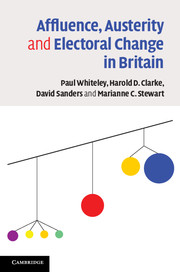Book contents
- Frontmatter
- Contents
- List of Figures
- List of Tables
- Acknowledgments
- 1 The politics of affluence and austerity
- 2 Tony's politics
- 3 Gordon's politics
- 4 ‘I agree with Nick’
- 5 Making political choices
- 6 Bearish Britain
- 7 Choosing how to choose
- 8 Performance politics and subjective well-being
- 9 Valence politics, austerity policies and electoral prospects
- Appendix A Design of the 2010 British election study
- Appendix B Measurement
- Notes
- Bibliography
- Index
1 - The politics of affluence and austerity
Published online by Cambridge University Press: 05 June 2014
- Frontmatter
- Contents
- List of Figures
- List of Tables
- Acknowledgments
- 1 The politics of affluence and austerity
- 2 Tony's politics
- 3 Gordon's politics
- 4 ‘I agree with Nick’
- 5 Making political choices
- 6 Bearish Britain
- 7 Choosing how to choose
- 8 Performance politics and subjective well-being
- 9 Valence politics, austerity policies and electoral prospects
- Appendix A Design of the 2010 British election study
- Appendix B Measurement
- Notes
- Bibliography
- Index
Summary
In the May 1997 general election ‘New Labour’ won a landslide victory. The roots of the New Labour project lay in four successive, traumatic election defeats experienced by the party over the period from May 1979 to April 1992. The gradual transformation of Old Labour during these years came to fruition in 1997 and it produced a spectacular electoral success under the leadership of Tony Blair. Two more victories followed in 2001 and 2005, making Blair the only Labour leader in history to win three successive general elections. In May 2010, the New Labour era ended. Although the 2010 general election produced a hung parliament, Labour's much reduced share of seats made it very difficult – virtually impossible – for the party to continue in power as part of a viable coalition government. After five days of intensive interparty negotiations, Gordon Brown resigned as prime minister and Conservative Leader, David Cameron, was invited to form a government. The result was the Conservative–Liberal Democrat Coalition, Britain's first such government in over half a century.
In previous books, Political Choice in Britain (Clarke et al., 2004b) and Performance Politics and the British Voter (Clarke et al., 2009b), we have investigated alternative explanations of voting behaviour that have been proposed to account for the fates of British political parties both in the ‘New Labour’ era and more generally. We have provided a theoretical account of electoral choice which applies not only to Britain but also to other contemporary mature democracies such as Canada, France, Germany and the United States (see e.g. Clarke et al., 2009a; Clarke and Whitten, 2013; Lewis-Beck et al., 2012). According to this account, electoral choice in these countries is best understood as the product of the process of ‘valence’ or ‘performance’ politics. In a world of valence politics – where stakes are frequently high and risk is often better described as uncertainty – voters make choices primarily on the basis of evaluations of rival parties’ perceived abilities to deliver policy outcomes on salient issues involving broad consensus about what government should do.
- Type
- Chapter
- Information
- Affluence, Austerity and Electoral Change in Britain , pp. 1 - 22Publisher: Cambridge University PressPrint publication year: 2013



